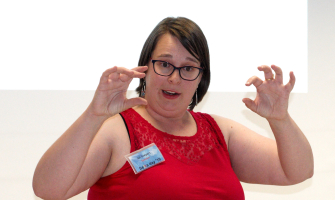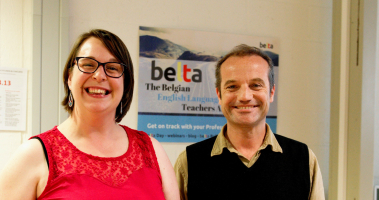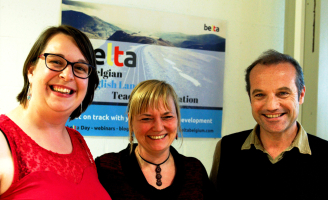- Home
- BELTA Blog
- An Sneyers, 2019 Belgian IATEFL Presenters Travel Grant winner, on why she loved the IATEFL Conference 2019
An Sneyers, 2019 Belgian IATEFL Presenters Travel Grant winner, on why she loved the IATEFL Conference 2019
20/12/2019 - 12:13
In 2019 BELTA member An Sneyers won the Belgian IATEFL Presenters Travel Grant. This is her account of the IATEFL conference she attended as a presenter in Liverpool. If you are eligible to win this BELTA grant in 2020, make sure to send in your proposal before 1 January 2020 to beltapresident@gmail.com. You can read the requirements on the BELTA website under 'PDA Fund & BELTA Travel Grants'. The name of the winner will be announced in February 2020!
5 Reasons why I loved the IATEFL conference (and why you should be there in 2020)
By An Sneyers
Hi there, I’m An. This year I was selected by BELTA to receive the Belgian IATEFL Presenters Travel Grant to help me attend IATEFL and present my ideas there. I was born in Belgium and have been living and working in Australia for the past 12 years, so this trip has been a little like coming home for me. I moved right after I finished my teacher training at the Katholieke Hogeschool Leuven with a strong desire to spread my wings and experience what it was like to teach English on the other side of the world.
Throughout my career I’ve known of IATEFL and had wanted to go the conference for a very long time but living so far away it wasn’t straightforward to attend. In 2013 I did some professional development courses in the UK and in Malta and some of the people I met there were regular attendees, so they would ask me year after year if I was coming this time. This year, I was so pleased that with the support of BELTA I could finally experience Europe’s largest EFL/ELT conference for myself.
Professional development as a teacher has always been important to me. Over the years, I’ve continued to upgrade my skills in a wide variety of ways and I’ve not been one to shy away from a challenge. I’ve taught in a variety of contexts, from teaching Dutch-speaking secondary school aged children in Australia in a mixed year 7-12 class to working with asylum seekers and refugees in Australia’s detention centre on the Pacific island of Nauru. Most of the time, however, I’ve helped international students coming to study at Australian universities with their academic skills and adjusting to life in a new culture.
To keep myself stimulated, I challenged myself to speak at my first conference in 2011, the English Australia conference. That was huge for me, because while it may not be so obvious these days, I used to be really shy and wasn’t very confident in my abilities. That experience put me on a path full of challenges, adventures, and it helped me to learn new skills like how to do action research and to incorporate skills from other fields like behavioural psychology, which I’ve been studying for the past 3 years. It stimulated me to start developing my own teaching models and techniques to help set up students for success, which I’m now incorporating in the online education programs I’m building, such as the forthcoming Ultimate Study Skills Success program and the Overworked Teachers Recovery Hub.
So, I really believe that delving in the world that opens up from attending a conference like IATEFL is simply phenomenal – both professionally and for the path it can put you on which takes you far beyond ‘just your job’. Here’s what I loved about the IATEFL conference. I trust you will next year as well.
1. Opportunity to connect with influential voices in the world of ELT
As Belgians, we are very fortunate that we are so close to the UK, a huge driving force behind what’s moving in the world of English language teaching. A lot of research gets done here, a lot of the books we use and learn from are published here (or the ones that inspire local variations) and there are a lot of teaching methods, activities, approaches, materials etc. that get developed right here in the centre of Europe.
What’s even better, is that the people behind those materials, books, methods we’re using in our classrooms are regular attendees and IATEFL conference. So it’s possible to hear from the horse’s mouth, pick their brains and learn how they think about education and life in general. This year at IATEFL there were opportunities to learn from Jeremy Harmer (if you’ve done a CELTA course you’ll recognise his name from the teacher training book you probably bought, and he’s also written and edited a stack of books on English teaching), Jill Hadfield (who’s published a number of books with learning activities you are likely to have stumbled across at some point in your career), Scott Thornbury (author of many How to Teach books – edited by the above mentioned Jeremy Harmer - and the co-creator of the concept of Teaching Unplugged), Adrian Underhill (if you’ve got a pronunciation chart in your class room, it’s probably the one he created) and so many others. A true feast of professional inspiration.
Everybody I met at IATEFL was extremely approachable and very happy to share what they were working on, what lights them up, what inspires them and what drives them to keep improving their practice. Because the conference has a pretty solid social program, it’s even possible to sing alongside them at the open mic night!
2. Get inspired by colleagues from around the globe doing cool things with their students
There are so many of us trying out great things in our classrooms, and it’s really inspiring to pick up some ideas and give them a go yourself. Here are my top 3 of talks I attended and the things that I’m taking away from this year’s conference. Please bear in mind that I’m cherry picking here, because with about 500 or so sessions to choose from I obviously wasn’t able to attend everything.
Richard Harrison shared some ideas for getting students to think more critically by teaching them how to ask better questions. He distinguished between factual and ‘difficult’ questions, which tend to be more probing, inconvenient, perceptive, searching etc. He suggested 3 useful questions for critical thinkers: 1/ What exactly do you mean by…? 2/ What evidence is there…? 3/ What are your sources?
I believe this last question is something that is often worked on at least a little bit in academic courses, but the first two I find particularly interesting as they also pertain to this other interest I have, namely in human behaviour and applied psychology. Clarification is super important in any form of communication because we all operate from our own perception of the world, which is influenced by our own upbringing, beliefs, values, culture, identity etc. So each of us has a slightly different association with every single word that you hear. It means something else to each person you meet. So this first question in my opinion isn’t just important for critical thinking, but also in improving communication tout court. And wouldn’t that be a good thing for our world and the people in it? And of course, it’s a healthy thinking strategy that can be applied in the classroom but also well beyond to always question yourself and ask ‘How do I know that? Is that really so? Could it be that there’s something I’m not seeing?’ After all, our brains are programmed to be very selective in what stimuli they focus on and there’s a number of cognitive process that take place, like mainly stemming from our survival programming,
With this second presentation in my top 3 I’m probably a little bit biased, because it was a presentation by my co-researcher and friend Melissa Oldroyd on teaching students active listening skills so they become better able to create real (as opposed to stunted or rehearsed) communication in the classroom and out. Even though in teaching methodology we often look at listening and speaking as distinct skills, in reality they rely on each other in spoken conversation. It turns out that learners’ communicative ability and confidence can be vastly increased by teaching students active listening skills through experiential activities on sub-skills such as understanding and utilising body language, back-channelling, reflecting ideas, words and emotions back to the speaker (including paraphrasing), asking for clarification, asking and giving interesting follow-up questions and comments. If you want to know more about this project, you can read about it in Cambridge Research Notes Issue 69 and access 2 activities from the project here.
The session that blew me away the most came from a project that is very near to my heart: The Hands Up Project. What started as a story telling project whereby English teachers would collaborate via video conferencing with a local teacher in Gaza has now evolved to include remote theatre. The concept is simple. A group of maximum 5 children write their own 5-minute play and perform it live in front of a fixed camera using only music and props they’ve created themselves. The result is exceptionally powerful! In his session Nick Bilbrough created a live Zoom connection with 3 groups of children/teachers in Gaza and provided us, teachers, a part of the plays they had created. Our task was simple: turn this into a play that you will perform live for these children in 10 minutes. The result was both fun and a heart-lifting experience. We also received feedback from the students. Some absolutely loved it, while one kid was a bit more critical and said it was ‘not bad, but here’s how I would do it.’ before enthusiastically enthralling us with a most magnificent rendition of the part. If you want to know more about the Hands Up Project, I highly recommend checking them out and getting involved. You’ll also love the book with some of the kids’ plays, the downloadable lesson materials you’ll find and some of the video recordings of kids’ plays on the Hands Up Project YouTube channel.
3. The culture is very inclusive
Unlike some other conferences I’ve attended, IATEFL is not a catered event in order to keep the cost down to make it possible from people on various budgets to attend. And people do attend from around Europe and the world. I met people from Russia, Turkey, the Netherlands, Germany, Canada, Oman, Saudi Arabia, China, Spain, Belgium and many others.
The conference program caters for a wide variety of educators so there is something for everyone. The different sessions are grouped and coded by theme, which makes it significantly easier to shortlist what you want to go to. In my case, I am particularly interested in learner autonomy, so I knew that everything linked to the Learner Autonomy Special Interest Group (or SIG) would be right up my alley and I’d be likely to meet like-minded people there to exchange ideas with. When you become an IATEFL member you can select one SIG that is of special interest to you, so you are always kept in the loop on what’s happening in the field in relation to what’s most relevant to you.
The organisers of IATEFL organise a variety of social events to help teachers connect with each other in a social setting and does an exceptional job at creating a very low-key, easy to access and appreciative atmosphere. There’s a Special Interest Group night, welcome event, a quiz, a story telling night, an open mic night.
4. Feel professionally stimulated
I’m a firm believer that continued engagement with various professional development activities that YOU choose and are interested in is absolutely essential in feeling professionally fulfilled as an educator. It keeps you on your toes and helps you to continuously re-ignite your passion for education and learning.
What I love about IATEFL is that it is very teacher focused. This is in contrast with some other conferences where the cost or timing may be prohibitive for teachers and the program seems more focused on managers. What’s great about this is that you get to connect with other educators like you from different contexts and countries. You can find out what’s working for them, and be inspired by the interesting things they’re trying out in their classrooms so you can do the same.
Conferences are also a great place to learn about things you might otherwise not be exposed to, like action research or cross-pollinating from other fields. If it wasn’t for the English Australia conference I attended years ago, I never would have heard about the possibility to do small scale research projects in my class, trialling out creative ways to improve a particular aspect of my teaching practice to better help my students.
5. Combine travel with work
I don’t know about you, but I love travelling and exploring places I haven’t been. If I can incorporate this passion into other parts of my life, including my professional life, even better. It’s one of the things that makes ‘work’ continue to be incredible inspiring and fulfilling for me. More often than not it doesn’t feel like work at all.
This year I felt really lucky that the IATEFL conference was in Liverpool, a city I’d previously visited en route to another professional development adventure in the UK and really loved. It’s a place with lots of character and history. Once a major centre of shipbuilding in the world, as well as the home of the Beatles and tens of other bands, Liverpool has a lot going for it. During my last visit I loved learning about Liverpool’s connection with Titanic and the slave trade (obviously not at the same time) at the Maritime museum, and visited the TATE. The docks area really is stunning and also houses a number of delightful restaurants. The Cavern is a must visit place for any music lover. And this time I was pleasantly surprised by the diverse and interesting collection at the World Museum and was fortunate enough that the conference coincided with an exhibition on Charles Rennie Mackintosh’s work.
So travel is definitely a wonderful side benefit to attending IATEFL, which is held at various places around the UK every year. Next year: Manchester!
So there you have it, plenty of reasons to cross the Channel next year and join the Belgian delegation at IATEFL, whether as an attendee or as a speaker.



